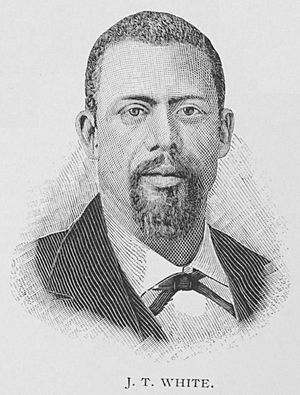James T. White (politician) facts for kids
Quick facts for kids
James T. White
|
|
|---|---|

White in 1887
|
|
| Born | August 25, 1837 New Providence, Indiana, U.S.
|
| Died | March 13, 1892 (aged 54) Helena, Arkansas, U.S.
|
| Occupation | Educator, minister, politician, journalist |
| Political party | Republican |
| Religion | Baptist |
James T. White (born August 25, 1837 – died March 13, 1892) was an important Baptist minister and a politician in Arkansas. He served in the state government, first in the Arkansas House of Representatives and later in the Arkansas Senate, during the late 1860s and early 1870s. He also helped write the Arkansas state constitution in 1868 and 1874.
White was an African-American and a member of the Republican Party. In 1868, he was one of the first six African Americans to serve in the Arkansas House of Representatives. He also worked as a journalist, editing a Baptist newspaper called The Arkansas Review.
Contents
Early Life and Ministry
James T. White was born in a town called New Providence, Indiana. His parents were James and Catharine White. In 1850, when he was 13, his family moved to Indianapolis, the capital city of Indiana. Sadly, both his parents had passed away by 1860.
White became a member of the Baptist church when he was 17. By the age of 21, he had become a minister, which means he was a religious leader.
In 1865, White traveled to St. Louis, Missouri, for a large meeting of Baptist leaders. While there, he was invited to Helena, Arkansas. On August 21, 1865, he became the pastor of the Second Baptist Church in Helena. White moved to Helena with a group of African-American soldiers from the Union Army.
Arkansas had been part of the Confederacy during the Civil War. Many people there were not happy about the newly freed slaves. White's church first met in a government stable. Later, a kind army colonel allowed them to use an old church building. White worked hard and eventually built a small new church for his community.
Political Career in Arkansas
Starting in Politics
In 1867, White helped organize a meeting for Baptist churches in Arkansas. The next year, in 1868, he strongly supported the efforts of Reconstruction. This was a time after the Civil War when the U.S. government tried to rebuild the Southern states and give rights to newly freed slaves.
White was elected to a special meeting that created a new constitution for Arkansas. He was one of eight black delegates at this important meeting. He believed strongly that black people should have the right to vote. He also spoke out against a "poll tax," which was a fee people had to pay to vote. This tax often stopped poor black people from voting.
After the convention, White was elected to the state House of Representatives. He represented Phillips and Monroe counties. He worked on important committees, including those dealing with prisons and government rules. He was reelected to the House twice. Then, in 1871, he was elected to the state Senate, where he served one term. After that, he was given a job as the commissioner of public works, helping with state improvements.
During these years, more African Americans joined the Arkansas government. In 1868 and 1869, there were seven black legislators. By 1871, there were eleven in the House and two in the Senate, including James T. White. By 1873, there were twenty African Americans in the Arkansas legislature. White's brother, R. B. White, also served in the state assembly.
Challenges and Later Work
White continued his work as a minister while serving in politics. He successfully built two new churches, one in Helena and another in Little Rock. The Little Rock church was later destroyed by fire but was rebuilt. He also started the first Baptist District Association for Arkansas.
In 1874, Arkansas faced a political conflict called the Brooks–Baxter War. Two politicians, Elisha Baxter and Joseph Brooks, both claimed to be the governor. This led to fighting between groups of supporters. White worked to prevent people from Phillips County from joining these fights.
Later in 1874, White was elected to another convention to write a new state constitution. He also tried to raise money to start a college called Helena University, but this project did not succeed.
White played a key role in Phillips County politics. He supported an alliance between black Republicans and some white Democrats. Besides White's own time in the legislature, other black leaders held important local jobs, like county sheriff. White ran for other political positions, like circuit court clerk, but he was not elected.
In 1884, he started working for the Benevolent and Church Aid Society and became the editor of The Arkansas Review newspaper. In 1886, he attended a major meeting called the American National Baptist Convention. At this meeting, leaders discussed how to unite black Baptists and build their confidence. White spoke about the importance of economic progress and loyalty to the Baptist faith.
White was also involved in Freemasonry, a fraternal organization. He cared deeply about education and helped create public schools in Helena. In 1873, he served on the board of directors for the Helena Public Schools.
Death
James T. White stopped being the pastor of the Second Baptist Church in Helena in March 1891. He passed away a year later, in March 1892, from pneumonia in Helena, Arkansas.

